For fifty years, Palestine has been under Israeli occupation. One of the areas which has seen the most conflict between Israeli settlers and Palestinians is considered to be Hebron in the West Bank. So what is everyday life like with the occupation and the settlement policy?
By Anja Meunier / 10.3.2017
Settlement building sounds very peaceful. You imagine small houses in the midst of farmland, built by adventurers and explorers. However the reality is somewhat different. After the West Bank fell under Israeli occupation during the Six-Day War in 1967, Israeli settlements started appearing there. Many of them on land which, from an Israeli point of view, didn’t belong to anyone. Much of this land however was used by the Palestinian communities as common land, which in accordance to the customary law, was never registered in the land registry. In December 2016 the United Nations adopted a resolution, calling for an end to the Israeli settlement policy and declared the settlements as illegal under International law.
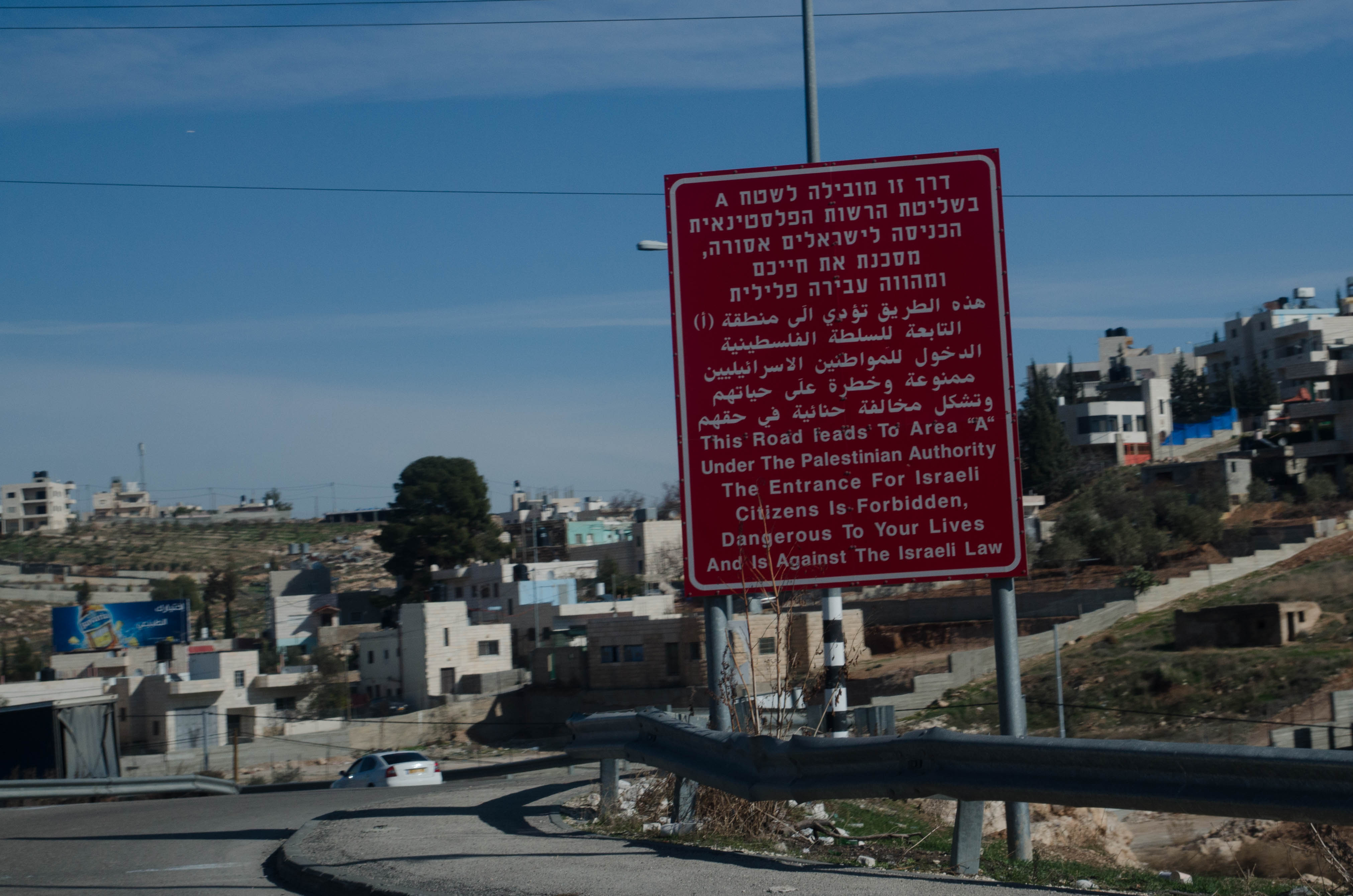
Sign on the border of occupation zone A © Anja Meunier
In fact, other Israeli settlements have even been built on registered private Palestinian land, which is also illegal under Israeli law. Nevertheless, the inhabitants are under military protection and in February 2017 the Israeli government passed a law, which retroactively approved 4,000 of these illegal settlements.
In Hebron, the conflict between Palestinians and Israeli settlers has become very heated. Hebron is the only city in the West Bank, where an Israeli settlement is located directly in the centre of the city. Hebron is of particular importance to all three monotheistic religions because it is where the three patriarchs; Abraham, Jacob and Isaac are buried, in the Cave of the Patriarchs in the old town. The proximity to these sacred sites, as well as the high social security benefits paid by the Israeli state to settlers, make settlements in Hebron very appealing to ultra-orthodox Jews.
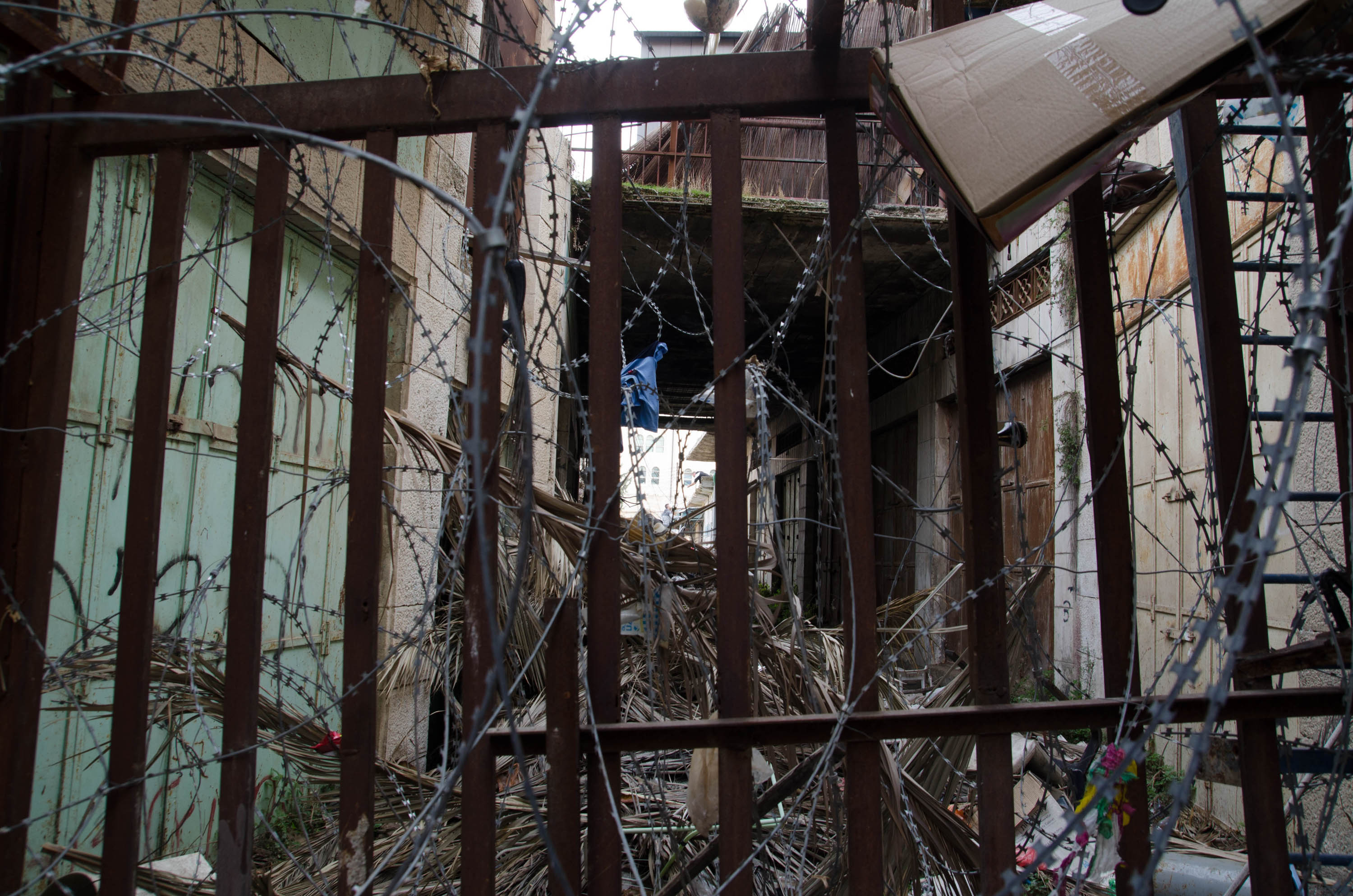
Part of the old market in the centre of Hebron © Anja Meunier
The settlement in the city centre – where about 500 Jewish settlers live – developed as a result of the unlawful occupation of private Palestinian houses. Due to the tension between the Palestinian population and the Israeli settlers, they are protected by around 3,000 soldiers. Whole blocks of streets are inaccessible to Palestinians and are cordoned off by checkpoints. The former market street is now almost deserted. According to the figures of B’Tselem, an Israeli information centre for human rights in the occupied territories, 42% of Palestinian homes in Hebron’s old town are empty or occupied by settlers and 77% of shops have now been shut down.
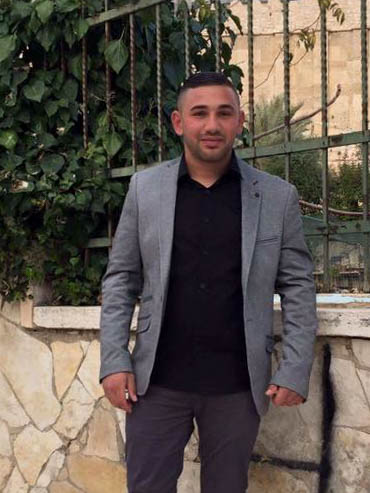
Ghassan grew up in Hebron’s old town. Photo: Private
Ghassan is 20 years old and grew up in Hebron’s old town. He is the owner of “Hostel in Hebron” and gives political tours of the old town to the few tourists who come to the city. He showed us the blocked off streets, where rubbish was piling up behind barbed wire fences, and told us how the people who are still living there are harassed and discriminated against. “People from Hebron are scared of coming to the old city, because here they get stopped and harassed by the soldiers. They don’t want people to come here, that’s why they give you a hard time, ask for your ID card all the time or stop you for hours without any reason, just so you would not come again.” There are buildings with a Palestinian shop on the ground floor and an Israeli settler apartment above. Sometimes rubbish, rocks or even bleach and urine are thrown down from above, Ghassan explained.
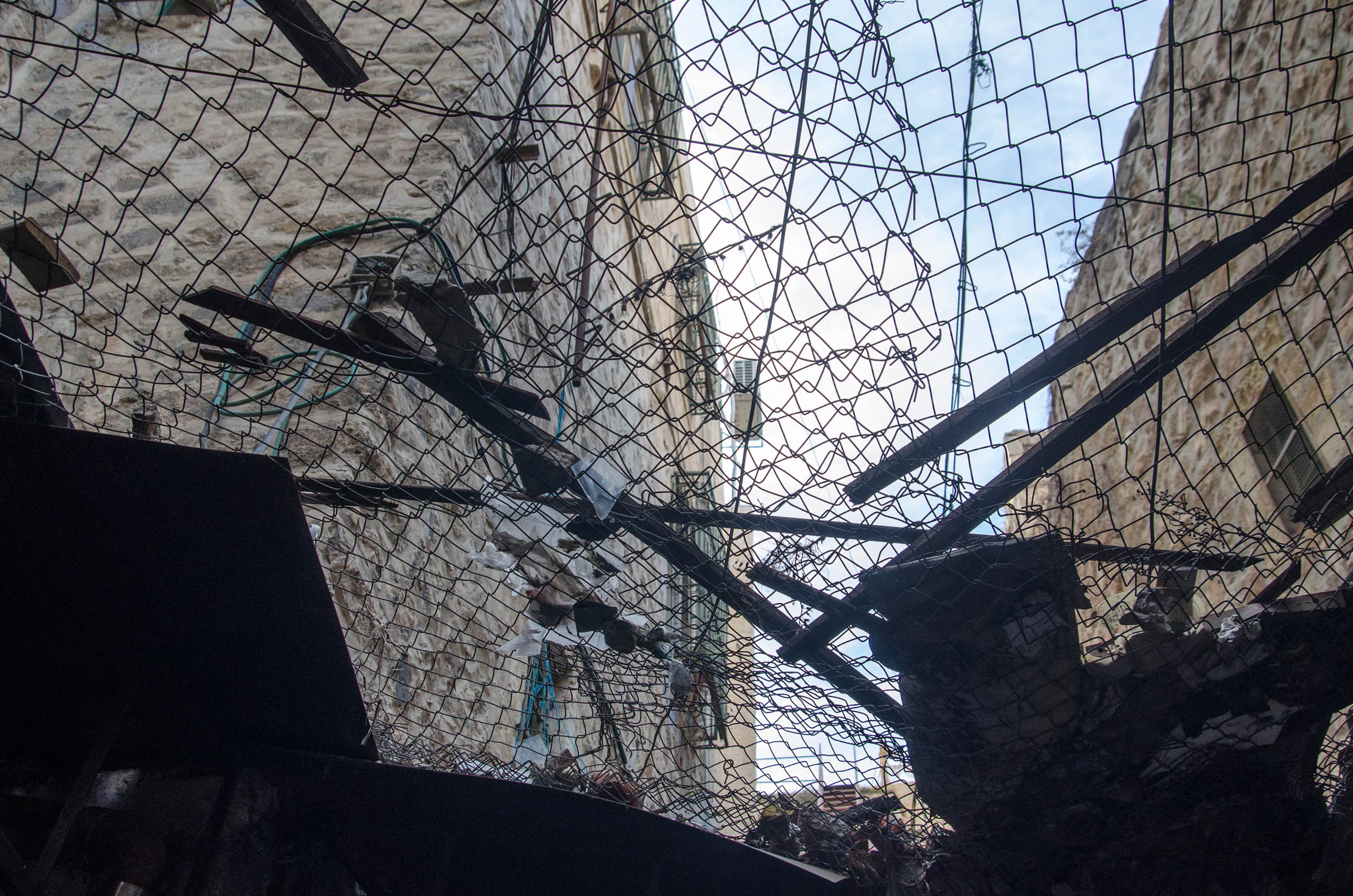
Mesh for protection against rocks and garbage © Anja Meunier
Many families are moving to the newer part of the city to escape the constant inspections and ongoing harassment. “Growing up here you don’t see many beautiful things, you see all the Israeli soldiers, you see all the Israeli borders, you see Israeli settlers who walk around on the streets with their guns and they harass you.” Yet Ghassan’s family still lives in the centre of the city. “If we leave our home, the settlers will move in and then they gain more territory yet again”.
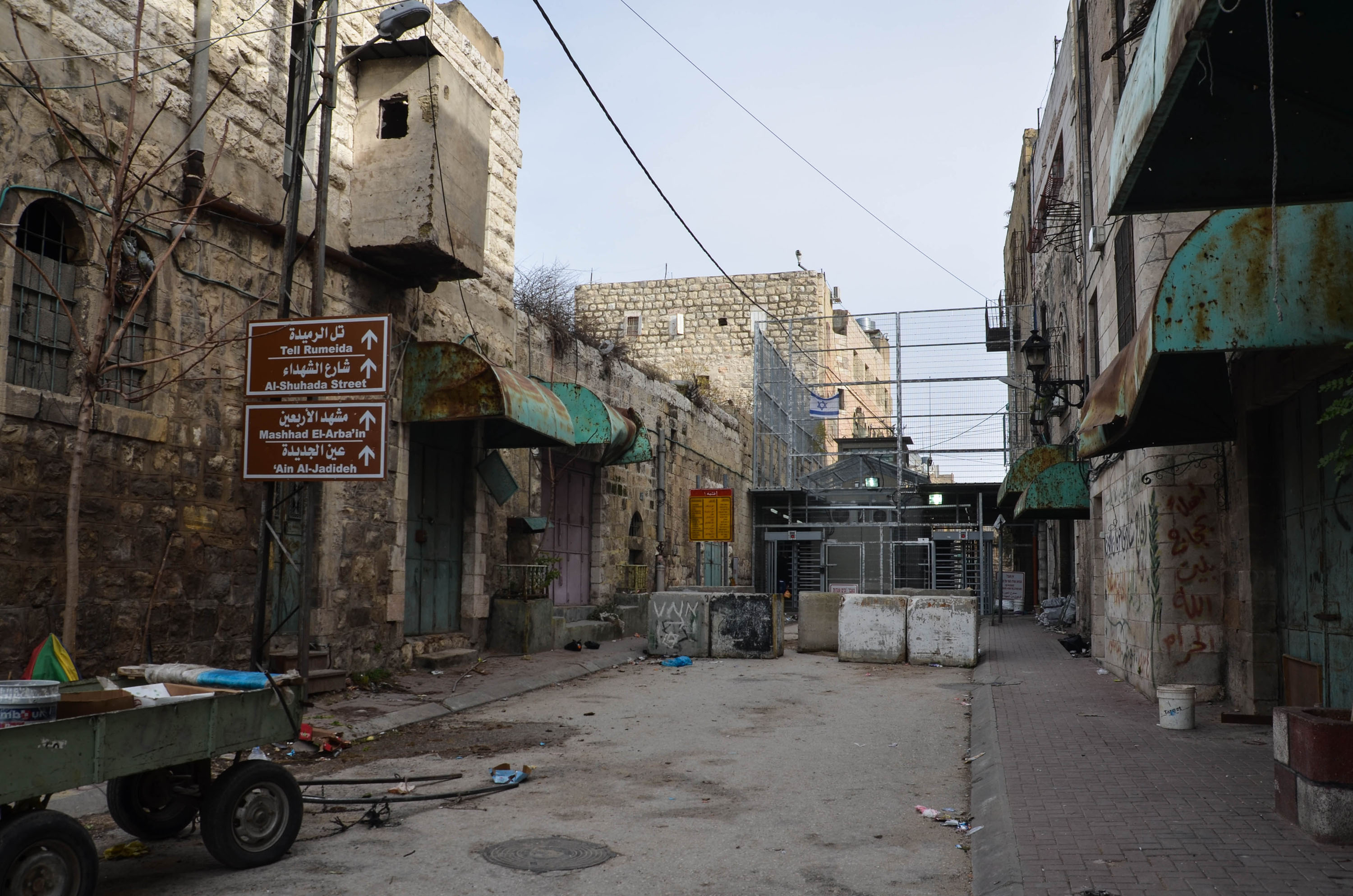
Checkpoint on the edge of the old town of Hebron © Anja Meunier
We visited Carol from the Christian Peacemaker Team, an international activist group, who lives in the centre of Hebron. They observe and document the situation, and if needed, peacefully intervene. Carol is a grey-haired lady, whom I would rather have seen in my grandmother’s living room than in a military-occupied crisis zone. But when she began to speak, this initial impression disappeared immediately. She spoke quickly and decisively and had a calm energy about her.
“Of course we only have limited opportunities to intervene”, she said, “but sometimes all it takes is for an international outsider to be there. When there are spectators, the behaviour usually changes.” It’s in this way, for example, that Carol and the other activists protect children on their way to school from excessively long inspections and other repressive measures. They are called immediately by friends and neighbours if there is an arrest or a major conflict somewhere; the members of the CPT then try to diffuse the situation. In addition to directly assisting on site, the activists also document the events and report back to human rights organizations and the United Nations.
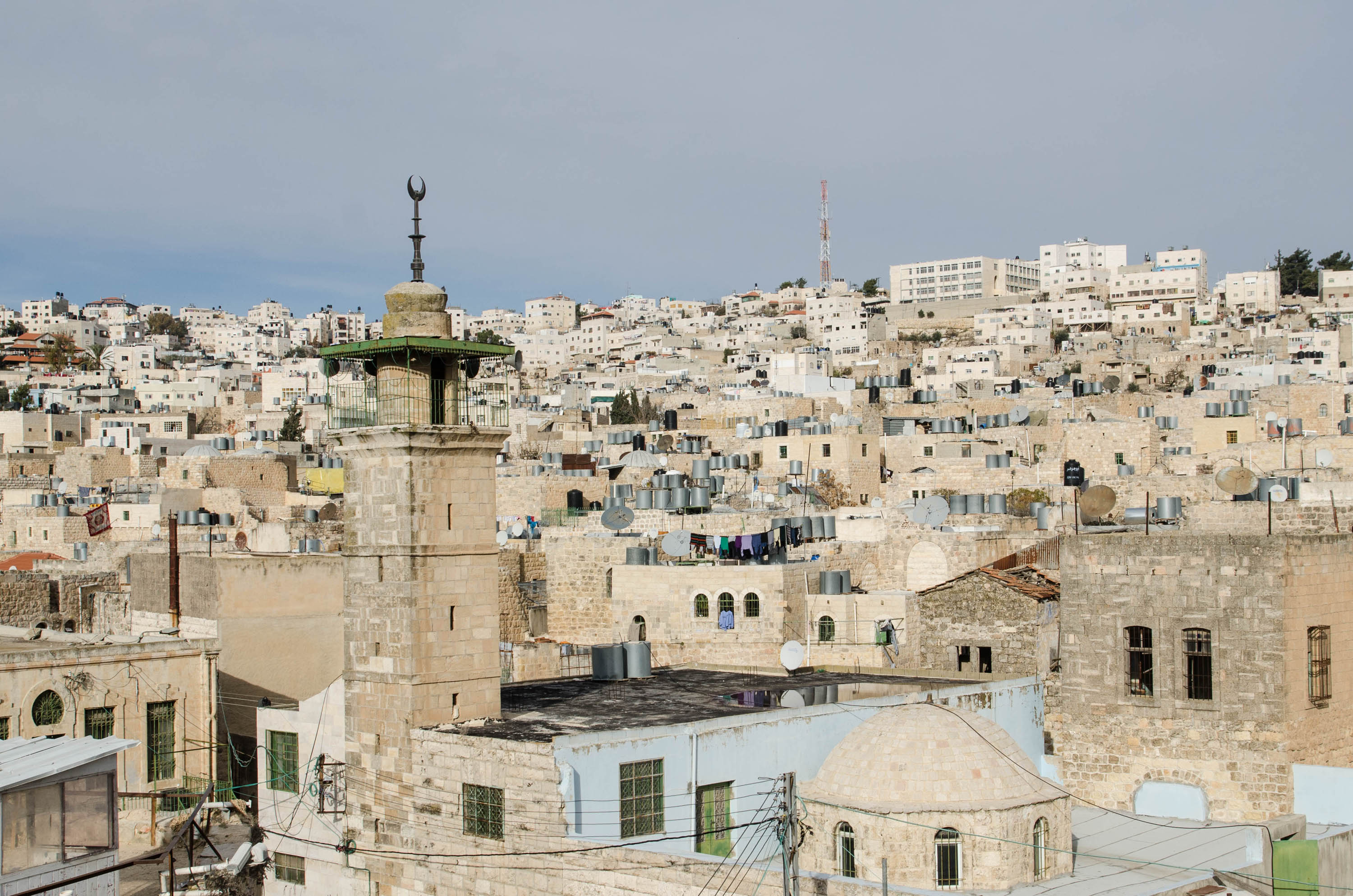
View of Hebron © Anja Meunier
Ghassan hopes that the conflict will end soon, he dislikes violent resistance and demonstrations. “I don’t go to demonstrations, because only one of three things can happen. You get injured, you get killed, or you get arrested.” Instead, he tries to inform people from other countries about the situation in Hebron during his tours. “I want people to know both sides; the Israeli and the Palestinian. The media doesn’t show what is happening here.”
Not only are there hardly any reports, on the international stage, about the circumstances in which people live in the areas occupied by Israel; many Israelis also don’t know what is happening either. Therefore the Organization B’Tselem has launched a project, distributing cameras to Palestinians living in areas where tensions are highest and where escalations are common. They want to counteract unilateral reports and reveal violations of human rights in these areas. Ghassan also hopes that this initiative will be a success. “The world thinks we are terrorists and criminals. But we are not. We are nice and friendly people who are wishing for a better future. We are humans like everyone else in the world. We want freedom and we want a good life, and to feel safe when we go home.”

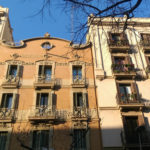



Recent Comments